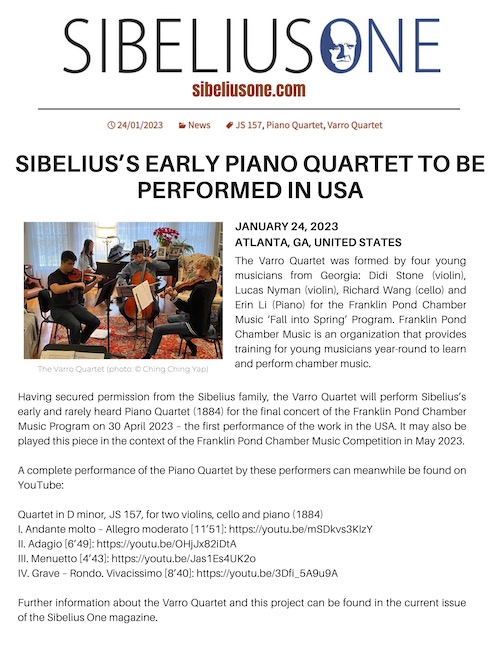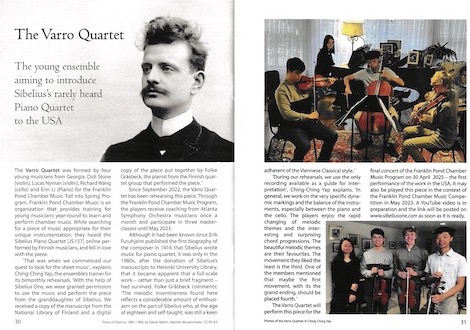In the classical music world, the great composers’ works are catalogued, copyrighted, studied, debated, and generally analyzed down to the last blot of ink on the page. Sometimes, however, a manuscript falls by the wayside—gets pushed to the back of a drawer or lost in a box during a move. Or, perhaps, circumstances and timing allow a great work to simply fade from memory. This is the story of how one such abandoned work received its revival right here in Georgia…
Since elementary school, my children have been playing together in a string quartet, appropriately named Quartet Le Petit. In 2022, when my oldest, a violist, left for UGA, my son invited a pianist to join the ensemble. It now being a rather unique ensemble of two violins, cello, and piano, we began searching online for music to play. It was here that we stumbled upon a recording--the only recording—of a piano quartet, JS 157, written by Jean Sibelius. The sheet music, however, was nowhere to be found.
After several futile attempts to find the music, I posted an ask on the website SibeliusOne.com, a non-profit organization formed to advance, improve, develop and maintain public education in and appreciation of the life and work of Jean Sibelius. Within a few hours, I received a response from Andrew, their General Manager, who informed me I must request written consent from Sibelius’ granddaughter, Aino Porra, as she handles all matters of permission for the estate. Once consent was given, he said, I could then order photocopies of the manuscript from the National Library of Finland.
Sibelius’ granddaughter—how intriguing! I contacted her and she very willingly granted me permission to request sheet music. So now it was on to the National Library of Finland and Petri Tuovinen, their Information Specialist.
Petri kindly explained that their library has the manuscript but no mechanism to receive international payment except through the interlibrary loan process. I contacted my local library but was informed they do not have the ability to request international interlibrary loans. Still undeterred, I contacted a friend, who requested the manuscript through her university library system. After a long waiting period, I tried Petri again to see if the National Library of Finland had received the university loan request. They had not. At this point I decided to throw in the towel.
The very next day, however, I received a surprise email from Petri containing a PDF of the manuscript and a note explaining how my persistence in this matter had moved her to scan and send the manuscript directly to me at a cost of about $45. I was thrilled and immediately printed out the three attached files. To date, I have not received an invoice from the National Library of Finland.
The handwritten manuscript contained in these PDFs was very clean, but the notation was small and extremely difficult to read. The first document contained all four movements; the second only fragments of music; and the third had a complete music passage with handwritten notes indicating it should be inserted into one of the movements. With renewed determination, I prepared to manually enter the music into Finale myself, using the one available recording as reference. After a few tedious tries, it occurred to me that the very musicians whose recording I was referencing must, in fact, have used some version of sheet music.
So, again I found myself back on the internet to track down the four quartet members. The first violinist, Jaakko Kuusisto, passed in February 2022 from a brain tumor. The second violinist, Satu Vänskä, is now playing with the Australian Chamber Orchestra in Sydney. The cellist, Taneli Turunen, is currently in Berlin. The pianist Folke Grasbeck is still in Finland, and to my relief his contact information was readily available. After waiting a week for Grasbeck to return from the vacation (apparently, the Finns like to enjoy the summer countryside without computers), he finally replied with a digital copy of the whole piece, the version they used for their 2005 recording. Success! Quartet Le Petit could now play the piece!
In my follow-up communications with Grasbeck, I learned that he is currently the president of Sibelius One. They were all extremely excited that Quartet le Petit was planning to learn and perform JS 157, because this would be the American premier! Yes, really! Quartet Le Petit will be premiering a work written in 1884 by the great Jean Sibelius!
So we finally come to today, when Quartet Le Petit is putting the final touches on JS 157 before it’s official American premier. As longtime participants of Franklin Pond Chamber Music, a year-round chamber music program for middle and high school students, the quartet has been rehearsing and coaching all school-year with Franklin Pond’s dedicated faculty from the Atlanta Symphony and Atlanta Opera orchestras. They have also brought this work to the attention of Franklin Pond’s visiting masterclass artists, such as Annie Fullard from the Cavani Quartet. With its grand harmonies typical of Sibelius’ later works and satisfying tonalities, we have all—students, parents, coaches, and masterclass artists--enjoyed getting to know this piece. To make the whole thing even more special, Sibelius was 18 when he wrote it, which is the same age as the members of Quartet Le Petit.
Audiences were able to hear Quartet Le Petit perform the premier Jean Sibelius’ Piano Quartet, JS 157 as part of Franklin Pond Chamber Music’s Fall Into Spring Concert in April of 2023.
Click images below to read more articles.




